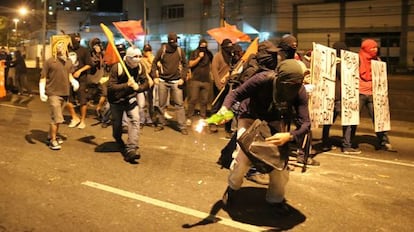Rio police to investigate the use of firearms by officers in Maracaná
Two agents used live rounds to disperse anti-World Cup protestors near stadium during a match

Rio de Janeiro police have confirmed that they are investigating two officers caught on video as they fired live rounds to disperse anti-World Cup demonstrators gathered near the Maracaná Stadium during the Argentina-Bosnia game on Sunday night.
The police did not deny claims that officers had used live bullets, as shown in recordings from various sources, including the Associated Press. But, hours after the incident, their press attaché accused demonstrators of throwing Molotov cocktails at security forces. One of the two in question is a uniformed military police riot officer in charge of crowd control. He has used tear gas, stun grenades and rubber bullets against protestors since the beginning of the World Cup. The second officer, dressed in plain clothes, has been identified as an inspector in the civil police corps.
“The riot police officer holding a lethal weapon who appears in images published on the internet voluntarily turned himself in to his unit commander,” the city’s military police said on Tuesday afternoon in a statement. The announcement also noted that the officer in question will not participate in any crowd control activities while he is under investigation. It remains unknown whether the second officer, Inspector Luiz do Amaral, was acting undercover to keep a close eye on the activists marching or if he encountered them outside of his working hours and shot in the air to help disperse the crowd.
The police press attaché accused demonstrators of throwing Molotov cocktails at security forces
The events took place in Tijuca, a residential neighborhood two kilometers from Maracaná. The police have placed a cordon around the vicinity of the stadium to prevent demonstrators from getting close. The large deployment of security personnel in the area made an impression on Argentinean fans and journalists attending the match.
Protestors were denouncing what they consider excessive spending and the poor and corrupt allocation of public funds during preparations for the tournament. The marches have been taking place throughout the country for the last year. One hundred and eighty-three journalists have been assaulted at these protests in that period. According to journalists’ union Sindicato Brasileño de Periodismo de Investigación (ABRAJI), 80 percent of those victims were hit by military police officers despite the fact that they were wearing proper credentials.
On Sunday, a military police sergeant detained O Globo reporter Vera Araújo in the neighborhood of Boa Vista as she filmed the arrest of an Argentinean fan urinating in the street.
In the last few months activists have held hundreds of demonstrations but the gatherings have gotten smaller. However, many have become more violent with some protestors wearing masks and using black bloc tactics. Demonstrators have also broken glass windows in several bank offices in areas near the stadium.
Translation: Dyane Jean François
Tu suscripción se está usando en otro dispositivo
¿Quieres añadir otro usuario a tu suscripción?
Si continúas leyendo en este dispositivo, no se podrá leer en el otro.
FlechaTu suscripción se está usando en otro dispositivo y solo puedes acceder a EL PAÍS desde un dispositivo a la vez.
Si quieres compartir tu cuenta, cambia tu suscripción a la modalidad Premium, así podrás añadir otro usuario. Cada uno accederá con su propia cuenta de email, lo que os permitirá personalizar vuestra experiencia en EL PAÍS.
¿Tienes una suscripción de empresa? Accede aquí para contratar más cuentas.
En el caso de no saber quién está usando tu cuenta, te recomendamos cambiar tu contraseña aquí.
Si decides continuar compartiendo tu cuenta, este mensaje se mostrará en tu dispositivo y en el de la otra persona que está usando tu cuenta de forma indefinida, afectando a tu experiencia de lectura. Puedes consultar aquí los términos y condiciones de la suscripción digital.








































